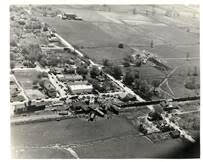Village History of Waldo, Wisconsin
Nestled in Sheboygan County, Waldo, Wisconsin is a community steeped in rich history, shaped by the hard work and resilience of its early settlers. Founded along the Onion River and intersected by key railroads, Waldo quickly grew into a vibrant hub of local commerce, industry, and community life.
Early Beginnings
Waldo began as a modest settlement with deep agricultural roots. Early maps show the layout of the village flanked by fertile farmland and the Onion River running through it. The dam and millpond became a key feature of the area, with a grant awarded in 1856 to build the dam. Over the years, the pond added scenic beauty and became a place of recreation. In 2012, the park area adjacent to the millpond was renamed in memory of former Village President Norbert E. Hintz.
Disasters and Resilience
Waldo’s early years were marked by multiple tragic disasters, many of which tested the village’s strength and unity. On May 15, 1896, a freight train derailed just outside the village after saboteurs placed railroad ties on the tracks, killing three and injuring many others. Other significant incidents included major fires: a lumber yard fire in 1934 started by children playing near a gasoline tank; a general store fire in 1936, bravely escaped by Elmer Donath and his family; and a 1940 fire that destroyed the Palace Hotel.
In 1948, a train derailment at 5:30 a.m. shook the town. Seventeen freight cars left the tracks, demolishing the depot. The cars scattered cargo—reportedly including bananas—all over the area, which fascinated local children.
Education
For 72 years, Waldo had its own school district. The high school graduated its final class in 1962 when the district merged with Sheboygan Falls. Education continued in the building until 1995. The structure later served as a preschool and a massage school before being sold again for redevelopment.
Since 1968, the Harley Harling Scholarship has provided a full four-year scholarship to one senior from the Waldo district annually. This scholarship remains active today. In addition, the Elizabeth Schneider Scholarship is also available to support local students pursuing higher education.
Religious Organizations
Trinity Fellowship Church, formerly known as Trinity United Methodist Church, is now a non-denominational Christian church. While it honors its Methodist heritage, Trinity Fellowship welcomes individuals of all backgrounds to worship and grow in faith together.
The area also included St. Thomas Lutheran Church, Waldo Baptist Church, and Lyndon Baptist Church, each playing important roles in the town’s spiritual and social development throughout the 19th and 20th centuries.
Government and Public Services
The Waldo Post Office has long been a community staple. Significant updates were made in the mid-20th century, including a major relocation and facility upgrade in 1964. Two rural delivery routes were operated out of Waldo until they were consolidated in 1940.
The Waldo Fire Department was reorganized in 1937 under new regulations and continues to be an integral part of the village. Equipment and facilities have consistently been upgraded, including a training structure built in 1985 and the addition of Engine 9 in 2018. The fire department has proudly served Waldo and neighboring rural areas with distinction.
Community Growth and Leadership
Over the years, the Village of Waldo has seen numerous improvements: underground telephone cables in 1969, improved street lighting, and installation of house numbers and street names. Passenger rail service ended in 1968, and the depot was converted into a private residence. Water and sewer services were extended to new subdivisions in the 1970s.
Throughout its history, the Village of Waldo has been served by many dedicated individuals who have taken on leadership roles to guide and support the community.
A Village that Endures
Through tragedy and triumph, the Village of Waldo has remained a close-knit, welcoming place where history is honored, and the future is built upon a foundation of faith, service, and resilience. The stories, images, and newspaper clippings preserved in Preserving the Past: Celebrating 100 Years of Waldo serve as a powerful reminder of the strength and character of this remarkable community.
